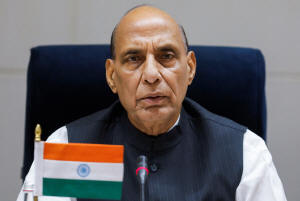India reports injuries on both sides in minor border clash with China
 Send a link to a friend
Send a link to a friend
 [December 13, 2022]
By Krishna N. Das and Sudipto Ganguly [December 13, 2022]
By Krishna N. Das and Sudipto Ganguly
NEW DELHI (Reuters) - Indian troops prevented Chinese soldiers from
entering Indian territory on Dec. 9 during a border scuffle that led to
injuries on both sides, India's defence minister said on Tuesday, in the
first such clash since 2020 between the Asian giants.
The incident occurred in the Tawang sector of India's northeastern
Himalayan state of Arunachal Pradesh, which borders China's south and is
also claimed by Beijing.
The Indian troops "illegally crossed the line to block" a routine patrol
of Chinese border troops, a spokesperson from the Western Theatre
Command of China's People's Liberation Army (PLA) said on Tuesday.
"We urge the Indian side to strictly control and restrain the front-line
troops, and work with China to maintain peace and security on the
border," the spokesperson said.
An Indian defence source told Reuters that patrolling teams from both
sides came face-to-face at one of the peaks there and that in an ensuing
hand-to-hand fight, some soldiers fell on the rocky surface and injured
themselves. Two other sources said around half a dozen Indian soldiers
suffered minor injuries.
The defence source said the un-demarcated border, called the Line of
Actual Control (LAC), means soldiers from both sides cross over into
each other's territory every now and then. Such events are then raised
in flag meetings so that they do not escalate.

"Sometimes we perceive some areas as ours, sometimes they do," said the
source, declining to be named as Defence Minister Rajnath Singh had
already issued a statement in parliament about an attempt by the PLA to
enter Indian territory.
"These are skirmishes that keep happening, and they are not major. This
was not major."
Singh told lawmakers that the scuffle led to "injuries to a few
personnel on both sides" but that there were no "serious casualties on
our side".
"PLA troops tried to transgress the LAC in Yangtse area of Tawang Sector
and unilaterally change the status quo," Singh said.
[to top of second column]
|

India's Defence Minister Rajnath Singh
speaks during a joint statement with U.S. Secretary of Defense Lloyd
Austin (not pictured) following their meeting in New Delhi, India,
March 20, 2021. REUTERS/Adnan Abidi

"The Chinese attempt was contested by our troops in a firm and
resolute manner. The ensuing face-off led to a physical scuffle in
which the Indian Army bravely prevented the PLA from transgressing
into our territory and compelled them to return to their posts."
China's foreign ministry spokesperson, Wang Wenbin, told a news
conference that the situation at the border was "generally stable".
India's foreign minister has said that relations with China can not
go back to normal without peace on the border. India has stepped up
scrutiny of many Chinese companies operating in India in the past
two years, though its imports from China have surged.
The scuffle was the first between the two countries since deadly
clashes in June 2020 when Indian and Chinese troops were involved in
hand-to-hand combat in the Galwan Valley of Ladakh, abutting the
Chinese-held Tibetan plateau.
The incident led to the death of 20 Indian soldiers and four Chinese
troops.
"The Chinese side was asked to refrain from such actions and
maintain peace and tranquillity along the border," minister Singh
said about the latest tension. "The issue has also been taken up
with the Chinese side through diplomatic channels."
The un-demarcated 3,800 km (2,360 mile) frontier between the
nuclear-armed Asian giants had stayed largely peaceful since a war
in 1962, before the clashes two years ago sent relations
nose-diving.
(Additional reporting by Rupam Jain and Shivam Patel in New Delhi;
Writing by Sudipto Ganguly; Editing by Raju Gopalakrishnan)
[© 2022 Thomson Reuters. All rights
reserved.]
This material may not be published,
broadcast, rewritten or redistributed.
Thompson Reuters is solely responsible for this content.
 |